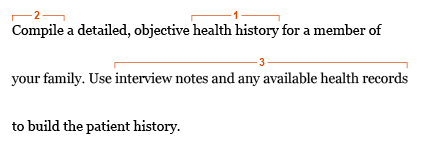Approaching assignments in the disciplines
When you receive a writing assignment, look for key terms that alert you to the purpose of the assignment and to the specialized language of the field. Also determine the kinds of evidence that would be appropriate to support your argument. At first glance, the following four assignments might seem to have nothing in common. A closer look will show that they all use key terms specific to the field, they all use the vocabulary of the field to describe the purpose of the assignment, and they all explain or suggest the kinds of evidence the writers should use.
- Key terms
- Purpose: to summarize and analyze research findings
- Appropriate evidence: articles, visuals, especially conflicting data
- Key terms
- Purpose: to analyze certain evidence and to argue a position based on that analysis
- Appropriate evidence: examples of corporate takeovers
- Key terms
- Purpose: to analyze similarities and differences
- Appropriate evidence: anthropologists’ field research
Once you have determined the expectations of a writing assignment, you must be sure to do the following, regardless of the discipline you are writing in.
- Determine your audience and purpose.
- Ask questions appropriate to the field.
- Formulate a thesis.
- Gather evidence. Conduct research if necessary.
- Identify the required citation style.



